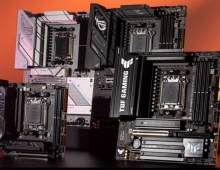
EU Add More Charges Against Intel
The European Union regulators have added three more charges against Intel under the antitrust case, claiming that Intel has forced rival AMD out of the chip market.
The European Commission warning Intel on Thursday that it may be ordered to
pay large fines.
"We're naturally disappointed the Commission has decided to issue a new SO (Statement of Objections). The issuance of a second SO suggests that the Commission supports AMD's position that Intel should be prevented from competing fairly and offering price discounts which have resulted in lower prices for consumers," Intel said in a statement.
"We are confident that the worldwide microprocessor market is functioning normally and is highly competitive in Europe and elsewhere. Intel's conduct has always been lawful, pro-competitive and beneficial to consumers. As evidence of the existence of a highly competitive and innovative microprocessor market, consumers have benefited from prices that have gone down significantly, output has increased many times over, and the performance of products, including ours, has improved exponentially,"Intel added.
AMD believes that Intel's policy does not allow customers to choose among the available CPUs. The company claims that Intel pays retailers and computer manufacturers to boycott non-Intel products.
Intel sells more than three-quarters of all microprocessors that run computers using Windows operating system.
The EU regulators accused Intel of giving a major PC retailer - Germany's MediaMarkt AG - substantial rebates in return for it selling only Intel-based computers.
It said Intel also paid a manufacturer to delay an AMD range of CPUs, and gave rebates to the same company in return for buying all its laptop CPUs from Intel.
The EU said all Intel's behavior was part of a coordinated strategy to exclude AMD or limit its access to the market. Intel has eight weeks to respond and can seek a hearing to put its defense to European regulators.
Regulators have previously accused Intel of selling chips below average cost to strategic server customers - such as governments and universities - when bidding against AMD-based products.
The EU said below-cost or predatory pricing may be good for shoppers in the short term but ultimately harms them by killing off rivals that would offer more choice and set a faster pace for innovation in the long term.
The U.S. Federal Trade Commission in June asked both AMD and Intel companies to supply information on possible antitrust problems in the microprocessor market.
South Korean regulators fined Intel $25.4 million last month, saying the semiconductor giant had used hefty rebates to persuade Samsung and other South Korean computer makers not to use AMD-made CPUs.
AMD also has filed a civil lawsuit against Intel in U.S. District Court in Delaware that is scheduled to go to trial in 2010 and could mean billions of dollars in damages if AMD wins.
"We're naturally disappointed the Commission has decided to issue a new SO (Statement of Objections). The issuance of a second SO suggests that the Commission supports AMD's position that Intel should be prevented from competing fairly and offering price discounts which have resulted in lower prices for consumers," Intel said in a statement.
"We are confident that the worldwide microprocessor market is functioning normally and is highly competitive in Europe and elsewhere. Intel's conduct has always been lawful, pro-competitive and beneficial to consumers. As evidence of the existence of a highly competitive and innovative microprocessor market, consumers have benefited from prices that have gone down significantly, output has increased many times over, and the performance of products, including ours, has improved exponentially,"Intel added.
AMD believes that Intel's policy does not allow customers to choose among the available CPUs. The company claims that Intel pays retailers and computer manufacturers to boycott non-Intel products.
Intel sells more than three-quarters of all microprocessors that run computers using Windows operating system.
The EU regulators accused Intel of giving a major PC retailer - Germany's MediaMarkt AG - substantial rebates in return for it selling only Intel-based computers.
It said Intel also paid a manufacturer to delay an AMD range of CPUs, and gave rebates to the same company in return for buying all its laptop CPUs from Intel.
The EU said all Intel's behavior was part of a coordinated strategy to exclude AMD or limit its access to the market. Intel has eight weeks to respond and can seek a hearing to put its defense to European regulators.
Regulators have previously accused Intel of selling chips below average cost to strategic server customers - such as governments and universities - when bidding against AMD-based products.
The EU said below-cost or predatory pricing may be good for shoppers in the short term but ultimately harms them by killing off rivals that would offer more choice and set a faster pace for innovation in the long term.
The U.S. Federal Trade Commission in June asked both AMD and Intel companies to supply information on possible antitrust problems in the microprocessor market.
South Korean regulators fined Intel $25.4 million last month, saying the semiconductor giant had used hefty rebates to persuade Samsung and other South Korean computer makers not to use AMD-made CPUs.
AMD also has filed a civil lawsuit against Intel in U.S. District Court in Delaware that is scheduled to go to trial in 2010 and could mean billions of dollars in damages if AMD wins.





















